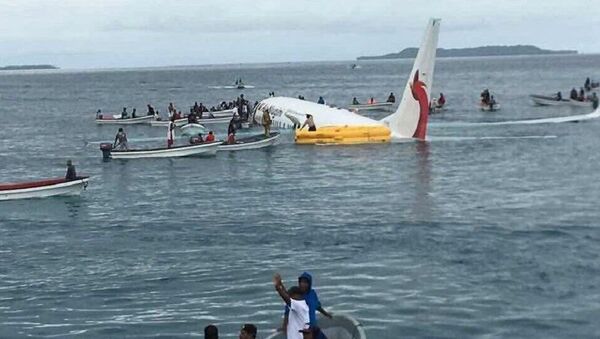In the footage, taken by an engineer in the plane’s jump seat, the pilots can be seen trying to change their trajectory as the aircraft’s Enhanced Ground Proximity Warning System (EGPWS) notifies them that the plane is too close to the ground.
"We're too low!" one pilot said seconds before the plane missed the runway at Chuuk International Airport in the Pacific island nation of Micronesia and landed in a lagoon. At the time, the flight had a total of 12 crew members and 35 passengers on board.
The moments before the crash are also detailed in a report released last year by the Papua New Guinea Accident Investigation Commission (AIC) regarding the crash landing.
"The phone survived the accident and provided clear imagery of the cockpit environment and instruments," the report noted, referring to it as "an invaluable source of vital information" for investigators.
“Two seconds before impact the copilot rapidly stated with high intonation: ‘Too low! We’re too low! We’re too low! We’re too low’ and the EGPWS sounded: ‘Sink Rate, Sink Rate’ as the aircraft impacted the water,” the report describes.
Investigators also indicated in their findings that the pilot in command was “over controlling the aircraft laterally.”
“There was no evidence to indicate that the sink rate was being arrested. There was also no evidence on the recorded data to suggest that environmental forces, such as downdrafts, updrafts, etc, influenced aircraft movement against pilot control inputs,” the report continues, suggesting that both pilots were “oblivious to the rapidly unfolding unsafe situation.”
Both US Navy divers and local boaters arrived on the scene to aid in rescue efforts. One passenger died and six others were seriously injured as a result of the crash.

